- Home
- Jodi Picoult
Where There's Smoke Page 2
Where There's Smoke Read online
Page 2
Somewhere in the back of my mind, in spite of all this horror, I think: It’s good TV.
That’s what I’m still thinking when I keep Betsey’s shoulder in a death grip and deliver the message I have for her before the cameras stop rolling.
“Friendly fire,” I say. “Your husband wants you to know he was killed by his own captain.”
By the time the fire department has cleared the building and we’ve gotten rid of the news cameras and Cliff, the grip, has been treated for second-degree burns on his hand, it is nighttime. Marcy is nowhere to be found—the producer has gone to talk to Cliff’s family, or give him a huge bonus, or a trip to Disney World or something to keep him from suing us. My bodyguard, Felix, drives me home and walks me into my house. “Can I get you anything, Miz S?” he asks. “You’ve had a pretty tough day.”
I shake my head. All I want right now is a big old glass of Cabernet Sauvignon and to put the last twenty-four hours behind me.
He disappears into the woodwork, like my housekeeper and my landscapers (they are so good at it, in fact, that I’ve sometimes wondered if I’ve mistakenly hired ghosts instead of humans. If I hadn’t seen Felix once flatten a crazy-ass stalker who thought she was my long-lost sister and was willing to jump me to tell me so, I would still have my doubts.) Then I light a magnolia-scented candle, pour myself some wine, kick off my heels, and put my feet up on the kitchen table—a handmade piece from Tuscany carved of olive wood.
“Well,” I say out loud to Desmond and Lucinda. “You two are being awfully quiet.”
You made that reading about you, not about her, Desmond answers.
I scoff. “I was doing my job.”
You were trying to get ratings, he replies.
“I didn’t set that damn fire,” I point out.
Lucinda, who is always the peacemaker, steps forward. I think Desmond is just reminding you to ask yourself why you’ve been given a Gift.
FYI, the answer isn’t “So I can buy a château in France,” Desmond snipes.
I’ve had just about enough of them for the night. “Why don’t you two get lost?” I snap.
Just like that, they’re gone. I can feel it in my chest—a lightness, as if I’ve just hung up a Gone Fishing sign and I’m no longer responsible for anyone else’s problems. I take a long drink of my wine and try to taste the flavors that Wine Spectator raved about and that made it score so high (and cost so damn much). Oak and chocolate and filigree (is that even a flavor?) and woodsmoke.
I think I can taste the chocolate in the wine, and I definitely smell the woodsmoke. But that’s because the bottom of my kitchen table is on fire.
I jump up so fast that my glass of wine shatters on the floor. The commotion brings Felix running into the kitchen, his gun drawn. When he sees the flames licking their way down the legs of the table, he grabs a fire extinguisher from a spot near the oven and hoses down the entire piece of furniture.
“You okay, Miz S?” he asks.
I check myself over, but I already know I’m fine. “Just a little shaken, Felix,” I tell him. “Must have been the candle.”
He nods and picks up the entire table as if it is a stick of kindling. “I’ll just put this out in the yard so’s it don’t stink up the house.”
“Thank you,” I tell him.
I consider cleaning up the broken glass but decide to leave it for the housekeeper in the morning. Instead, I walk to the master suite, strip off my clothes, and run the shower as hot as I can. It’s a cavernous shower, tiled with pearly marble. I stick a plastic cap over my hair and step inside.
The hot water loosens the knots in my shoulders, and gradually I start to let the day’s stress sluice down the drain. I close my eyes, replaying what happened in the studio today, wondering if we will be on the E! News broadcast tonight.
As if I’m back in the moment, I can feel the heat from the flames that burst from the broken studio light. But then I realize that the wall of fire is right here with me, in the shower. The two Turkish towels, hung within reach, are blazing.
Instinctively, I yank them off their hooks into the spray of the water. They fall on the floor, flames extinguished, smoking under my feet.
A realization comes to me, quicker than a bee-stung mare.
There are certain earthbound spirits that have no way to expend their energy or anger. They are often associated with teenage girls, who are formed of pure drama, or with those who’ve died in vain. They have been known to manipulate the elements of the earth—water, fire, wind, dust—to make their presence known.
Just my goddamn luck: Lieutenant Jason Rycroft is a poltergeist.
That night, I don’t get a lot of sleep, because I’m convinced that my quilt will combust and I’ll get toasted like a pig in a blanket. So I wear my sunglasses to the studio the next morning and don’t take them off, not even when I am told that Betsey Rycroft has left six phone messages or when Marcy comes at me, furious, with a stack of morning newspapers.
They all show the debacle in the studio yesterday. The headlines accuse me of being antiwar, anti-American, a traitor.
I smile feebly at my producer. “All press is good press, right?”
She crosses her arms. “It’s not funny, Serenity. Cliff’s out on disability and I’m buttering his family up one side and down the other, because Warner Brothers has strongly informed me they don’t want their lawyers to have to get involved. And if that isn’t enough, I got a call from the freaking head of the House Judiciary Committee.”
“The what?”
“House as in the House of Representatives,” Marcy continues. “They used to be called the House Committee on Un-American Activities and they investigated citizens who seemed to be doing subversive things. They wanted to know why you burned a bra your junior year in college.”
“It wasn’t because I was protesting a war,” I say. “There wasn’t even one to protest!” I whip off my sunglasses and wince at the light. “Marcy, I support our troops!”
“Well, that’s not the way it looked yesterday. The government’s invading a country and you go spouting off about friendly fire—”
“And today everyone and his brother is talking about the Serenity! show,” I interrupt. “Remind me why this is a bad thing?” I look down at the pink slips in my hand. “Betsey Rycroft is calling.”
“Well, for God’s sake, don’t call her back. The last thing we need is for her to go on Entertainment Tonight saying you’re going to help her unveil some military scandal.” Marcy is pacing. Today her beautiful braids are piled high on her head; she’s the one who takes me to get my hair done at the same place she’s gone to for years. I’m the sole white girl in the salon when I go, and I love it. Odalie, my stylist, custom-blends my signature shade of pink. “What you need to do is a show that glorifies an American hero,” Marcy murmurs. “Something that will take the heat off this episode.”
“No pun intended,” I say.
But she isn’t listening. Over my head, she’s staring at the television in my dressing room, which is tuned to Good Morning America. Joan Lunden has on Senator John McCoy and his wife, Ginny, and they are talking about their son, Henry, a seven-year-old who was kidnapped brazenly from the playground of his private school in Bethesda a week ago.
I look at the senator—a golden boy whose name’s been swirling around as a Democratic Party presidential candidate. He has good hair, straight teeth, a pretty wife, and a cute kid—everything you need to get elected in this country. But all that and a trust fund couldn’t get him his baby back. The FBI had taken the case over from the local cops, and seven days had gone by with not a trace of the boy or a single ransom note. Someone who didn’t know how to read people as carefully as I do might not notice how brittle Ginny McCoy’s features had become; how the senator had to process Joan Lunden’s questions for an extra beat, as if he were a foreigner who did not speak this language.
“Now that,” I muse, “is a tragedy. What happened yesterday, by comparison, is j
ust a little speed bump.” I don’t often trouble Marcy with my personal life, but I lean forward. “You’re not going to believe what happened to my kitchen table last—”
“That’s it,” Marcy says, snapping her fingers. “You’re going to find the senator’s son. And then you’ll be America’s favorite psychic again.”
I don’t like forensic work, even though I’ve done it before. I used to put on the booties and walk into a blood-spattered room and open myself up to get an action that might have gone on in there, a movement or sight or sound or smell or impression, or even which way a perp entered the room. But now, even if I get an impression about a missing kid, I don’t call investigators to tell them so. A lot of pseudo-psychics do that, but it’s not about the kid. It’s about the psychic getting fame. I just don’t have a dog in that fight.
I hear a snort, and I know immediately it is Desmond.
I am sick of his attitude, and I want to show him who’s boss. So I turn to Marcy. “Justine Fawker,” I say. “You remember her, don’t you?”
Marcy’s eyes light up. “The only time we beat Cleo in the ratings.”
This is true, and it was quite an upset, since Cleo was the one who gave me my own show. She was a TV personality with a higher international Q Score than the Pope and the President combined. When Cleo was photographed in US Weekly reading a book, it sold out in bookstores. When Cleo invited an unknown singer on her talk show, her single flew up the Billboard charts. I’d been invited to do a reading for her, and the episode won her an Emmy. In return, she gave me a spin-off.
Justine Fawker had been a cold case—a little girl who’d been abducted when she was eleven, and who’d long been presumed dead. After having her mother on my show, and getting a very firm response from the spirit world that Justine was not among them, we scheduled a live episode where, with Desmond’s and Lucinda’s help, I led the police to the home of a postal worker who had a secret soundproof cell in his basement—and had kept Justine caged in it for eight years.
“You swore to me you’d never go live again,” Marcy says. “You said it gave you hives in unmentionable places.”
“This is true,” I tell her. “But I’d do anything to help the McCoys find their boy.”
I do want to help that poor family, truly I do. However, it’s also occurred to me that this might potentially land me my own Emmy.
Marcy taps her pen against her teeth. “He’s not going to want to come on a show like ours,” she muses. “He’s more of a Larry King Live kind of guy.”
I hadn’t considered this. Asking a dignified politician to come on a daytime talk show about ghosts is hopeless. But then I remember that the woman who’d introduced me to Cleo in the first place was a politician’s wife I’d met in Maine. I’d diagnosed her daughter’s cancer before doctors could, and she was forever grateful. I still get Christmas cards from her and the governor, and she still writes on them, If there’s ever anything I can do for you.
I tell Marcy my plan. If this woman makes a call to Ginny McCoy, maybe she can convince her husband to come on my show.
Marcy, I can tell, is impressed by the way my brain works. “It’s a small world,” she says.
“Yes indeed,” I reply, “but I still wouldn’t want to paint it.”
By the time Marcy leaves my dressing room, I know she’s not even thinking of Jason Rycroft anymore. But I am, because just as she closes the door behind herself, my curling iron shorts out with a shower of sparks.
We are all psychic to a degree. How many times do you walk into a room and just know there’s tension in there? How many times have you thought about an old friend, and then she calls? Or had a dream about your grandma and you wake up and find the lost earring you inherited from her? It’s like making a psychic telephone call: you send energy into the universe, and it comes back to you.
I get asked all the time what it’s like in the next world. Well, it’s the same, and it’s not the same. For one thing, it’s less dense. You might find yourself still living in your apartment with the same creaky door and dripping faucet, for example—we tend to settle in the reality we know. But once you’re a spirit, there’s no physical resistance. You won’t be able to turn off the leaky faucet; you can swim through the creaky door without making a sound. There is no three-dimensional plane; there is no sense of time. You want to be somewhere? Bam, you’re there. You need to do something next Tuesday? Bam, it’s Tuesday.
Yes, spirits have sex, and no, I’m not telling you how. But even in the spirit world there are emotions and free will. The same things that trip you up as a human will tie you in knots as a spirit, if you don’t let go and let God.
Speaking of God, He’s real and He’s there, too. And don’t ask what He looks like because you wouldn’t understand even if I told you.
There’s just some things none of us are supposed to know, until it’s our time.
By the time that Senator and Ginny McCoy come to my show, Betsey Rycroft has left seven more messages for me, and Jason Rycroft has burned the curtains in my living room, my grilled cheese sandwich, and a big fat hole in the butt of my favorite pink dress. I attempt to contact him, but Desmond and Lucinda are clearly trying to teach me a lesson and they’ve gone AWOL.
“If you can hear me,” I say out loud to the poltergeist that has literally consumed my life for the past two days, “it would be lovely if you could take a break for a while.”
Bethany comes in to give me my five-minute warning as I am wondering if my St. John jacket is flammable. “You might want to have a fire hose on standby,” I tell her.
“Oh, buildings and grounds checked all the wiring,” she assures me. “We are a hundred percent safe.”
Sure, I think. As long as you don’t figure in a spirit with a chip on his shoulder.
This show we are doing without a studio audience, a request from the McCoy camp out of deference to their status and their suffering. But really, it doesn’t matter. It’s a tiny snippet that will be played before we go live wherever the spirits tell me Henry McCoy can be found.
I notice absently that my new couch is purple; the white one must have been stained by the fire extinguisher. I also notice that the McCoys are already sitting when I come onstage. But even before I get close enough to see their faces, I know something isn’t right.
The link between the spirit world and our world is made of collusions of energy. If you do a reading at an event and the energy is all discombobulated, it can affect the connection, so to speak. It’s why we screen our studio audience as if they’re applying for government jobs, and it’s why there’s never any alcohol on the set.
But right now, there is, and it’s swimming through the bloodstream of Senator John McCoy. And not to be outdone, his wife seems so doped up on antianxiety meds she probably couldn’t find her face with her own two hands.
Let’s do this, I say to Desmond and Lucinda, and all I hear in my head is the chirp of crickets.
Drawing in my breath, I walk to the couch and shake hands with the politician. His grip is firm and solid; his blond hair with just a hint of silver threaded through is smooth; his smile does not reach his eyes. His wife’s handshake, however, is not a shake but rather a limp press, as if she has already made the colossal effort to get out of bed and this is truly the best she can do. “I’m so sorry for your suffering,” I say, and I mean it. No one should ever have to go through what they have. “Are you ready to get started?”
“Wait,” Ginny McCoy says. “We’re not on camera yet, are we?”
I shake my head.
“My parents lived by themselves until they died in their nineties. Every night at ten P.M. exactly, my dad would turn off the television, and they’d go to bed. After my dad passed, I went to stay with my mom for a few weeks, to help her adjust. A few days after the funeral, we were sitting and watching TV when suddenly it shut off, at ten P.M. on the dot. I tried fussing with the remote and with the buttons on the TV itself, but I couldn’t get that thing to turn
back on no matter what. The next morning, it was working just like normal again.”
“Ginny.” Senator McCoy sighs, and she cuts him a look that could slice a diamond.
“I tell you this,” she says fiercely, “because I want you to know that I believe in what you do. I believe it’s possible. In case that makes a difference, I thought you should know.”
I look her in the eye, and nod. Desmond, I think. Lucinda? Don’t let me hang this poor couple out to dry.
The Psy-Chicks sing the theme song, and then a little clip rolls that I pretaped, explaining the disappearance of Henry McCoy. The camera closes in on me. “We’re here today with Senator McCoy and his wife, Ginny. Welcome.”
They both murmur something appropriate.
“It’s been a week since your son disappeared,” I say. “Yet there haven’t been any leads?”
“If there were,” McCoy says, “would I be here?”
Ginny grabs his hand and squeezes it, a warning. “We’re grateful to anyone and anything that can bring Henry home,” she corrects.
“And I’m hoping to be that person,” I say.
I open my heart and my head to the universe, and wait for a sign. I am listening with every fiber of my being for Desmond’s and Lucinda’s voices. I see Marcy waiting in the wings, holding her breath in anticipation of whatever I’m about to say. When nothing comes at first, she makes eye contact with me and signals with her hand: Hurry, already.
People who don’t have the Gift don’t realize you can’t turn it on and off like a tap. It’s hard, all the time, even when we make it look easy. But getting agitated isn’t going to help me clear the space I need to get a feeling from the other side.
I know that what the McCoys want to hear is that their son is alive, although after the Justine Fawker case I would be the first to tell you there are monsters in this world who make that option less than optimal. If Henry McCoy is alive, God only knows what he’s suffered. But if I cannot give them that peace of mind, I hope to at least let them talk to their little boy, if he’s crossed over. To let them know he wasn’t alone when he went.

 Small Great Things
Small Great Things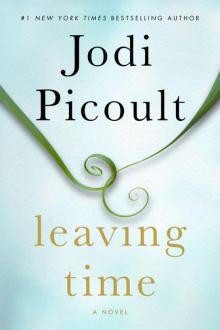 Leaving Time
Leaving Time Nineteen Minutes
Nineteen Minutes Larger Than Life
Larger Than Life Perfect Match
Perfect Match My Sister's Keeper
My Sister's Keeper The Pact
The Pact Handle With Care
Handle With Care Songs of the Humpback Whale
Songs of the Humpback Whale Mermaid
Mermaid The Tenth Circle
The Tenth Circle The Color War
The Color War Leaving Home: Short Pieces
Leaving Home: Short Pieces House Rules
House Rules Lone Wolf
Lone Wolf The Storyteller
The Storyteller The Book of Two Ways
The Book of Two Ways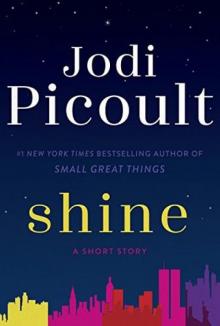 Shine
Shine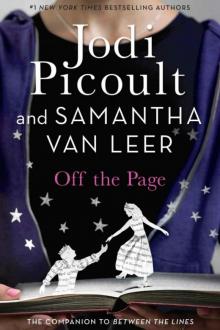 Off the Page
Off the Page Sing You Home
Sing You Home Second Glance: A Novel
Second Glance: A Novel Mercy
Mercy Vanishing Acts
Vanishing Acts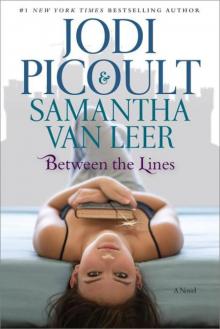 Between the Lines
Between the Lines Plain Truth
Plain Truth Salem Falls
Salem Falls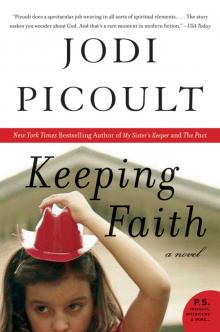 Keeping Faith
Keeping Faith Harvesting the Heart
Harvesting the Heart Change of Heart
Change of Heart Where There's Smoke
Where There's Smoke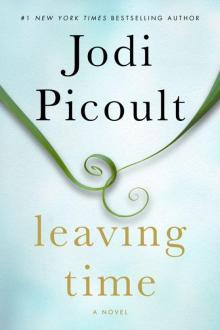 Leaving Time: A Novel
Leaving Time: A Novel Over the Moon
Over the Moon House Rules: A Novel
House Rules: A Novel The Jodi Picoult Collection #2
The Jodi Picoult Collection #2 Leaving Home: Short Pieces (Kindle Single)
Leaving Home: Short Pieces (Kindle Single) My Sister's Keeper: A Novel
My Sister's Keeper: A Novel![Mermaid [Kindle in Motion] (Kindle Single) Read online](http://i1.bookreadfree.com/i1/04/03/mermaid_kindle_in_motion_kindle_single_preview.jpg) Mermaid [Kindle in Motion] (Kindle Single)
Mermaid [Kindle in Motion] (Kindle Single) The Jodi Picoult Collection #4
The Jodi Picoult Collection #4 Sing You Home: A Novel
Sing You Home: A Novel The Jodi Picoult Collection
The Jodi Picoult Collection Lone Wolf A Novel
Lone Wolf A Novel Second Glance
Second Glance Larger Than Life (Novella)
Larger Than Life (Novella) The Jodi Picoult Collection #3
The Jodi Picoult Collection #3